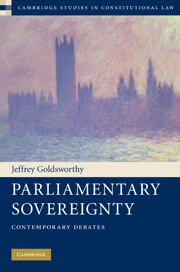Book contents
- Frontmatter
- Contents
- Detailed table of contents
- Acknowledgments
- 1 Introduction
- 2 The myth of the common law constitution
- 3 Legislative sovereignty and the rule of law
- 4 Homogenising constitutions
- 5 Abdicating and limiting Parliament's sovereignty
- 6 Trethowan's case
- 7 Requirements as to procedure or form for legislating
- 8 Judicial review, legislative override, and democracy
- 9 Parliamentary sovereignty and statutory interpretation
- 10 Challenging parliamentary sovereignty: Past, present and future
- Index
- References
5 - Abdicating and limiting Parliament's sovereignty
Published online by Cambridge University Press: 05 October 2010
- Frontmatter
- Contents
- Detailed table of contents
- Acknowledgments
- 1 Introduction
- 2 The myth of the common law constitution
- 3 Legislative sovereignty and the rule of law
- 4 Homogenising constitutions
- 5 Abdicating and limiting Parliament's sovereignty
- 6 Trethowan's case
- 7 Requirements as to procedure or form for legislating
- 8 Judicial review, legislative override, and democracy
- 9 Parliamentary sovereignty and statutory interpretation
- 10 Challenging parliamentary sovereignty: Past, present and future
- Index
- References
Summary
Introduction
The doctrine that Parliament possesses sovereign – legally unlimited – legislative authority has long been part of the foundation, if it is not indeed the foundation, of Britain's largely unwritten constitution. But the doctrine gives rise to a well-known conundrum: can Parliament's authority be used to limit itself? If it cannot, then it is already limited in this one respect; on the other hand, if it can, then while it is unlimited today it might not be tomorrow. According to the former view, Parliament's unlimited, sovereign authority is ‘continuing’; on the latter view, it is ‘self-embracing’. On the former view, parliamentary sovereignty is a potential obstacle to effective constitutional reform: any statute purporting to limit Parliament's authority can supposedly be repealed, even by implication, which means that it can be simply ignored. In the past, this view made it difficult for constitutional lawyers to conceive of how Britain's dominions could ever achieve full constitutional independence by lawful, rather than revolutionary, means. Even today, some lawyers have difficulty conceiving of how Parliament could effectively subordinate its authority to a constitutionally entrenched Bill of Rights, to a federal constitution transferring part of its authority to other legislatures within Great Britain, or to a new constitution for the European Union.
In an important new book, Peter Oliver deals with the question of colonial independence, although he hopes that his theoretical insights will shed light on other types of constitutional reform.
- Type
- Chapter
- Information
- Parliamentary SovereigntyContemporary Debates, pp. 106 - 140Publisher: Cambridge University PressPrint publication year: 2010

